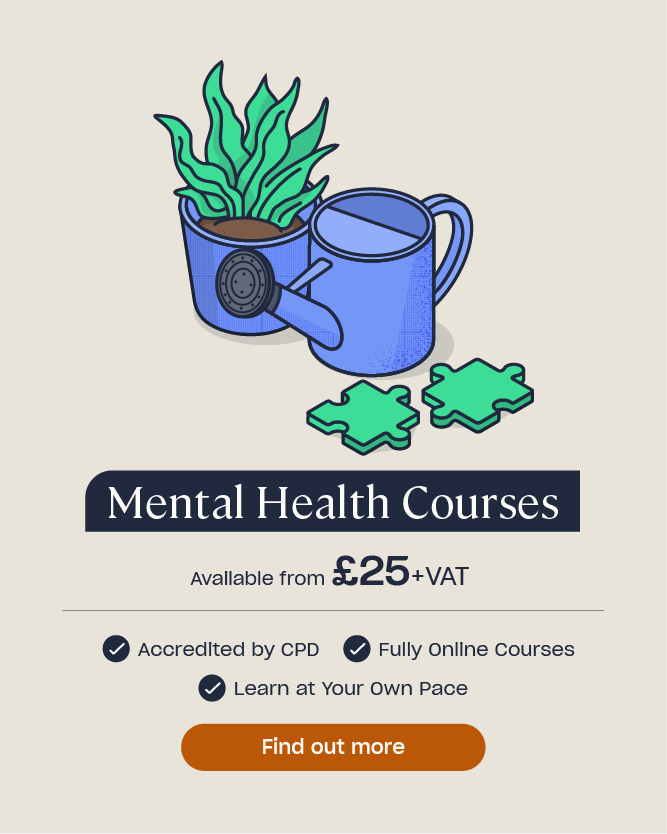Mental Health Myths vs Facts: What are the Realities?
Mental health challenges are sadly a prevalent issue in society and are widely misunderstood. Everyone has mental health, and problems can range from mild to debilitating – just like physical health. But unfortunately, not everyone understands how mental health affects others or even themselves.
According to Mind, approximately 1 in 4 people in the UK will experience a mental health problem each year and 1 in 6 people in England experience a common mental health problem in any given week – such as anxiety and depression. What’s more, suicide continues to be a leading cause of death in the UK for men under 50. Men are three times more likely to die by suicide than women, which is often attributable to the stigma surrounding mental health and simply ‘manning up’ or ‘dealing with it’.

These mental health statistics and facts, as well as the myths we’ll explore in this article, show just how commonly and seriously people can be affected by mental health challenges. They show why mental health needs to be acknowledged, supported, and most importantly better understood, rather than downplayed as someone ‘just going through a hard time’.
Mental Health Myths vs Facts
Despite how widespread mental health issues are, many myths about them still circulate and perpetuate the stigma. For example, many people underestimate just how commonly they affect people and misunderstand that poor mental health is not just about having a daily breakdown or being unable to function. This can lead to the perception that struggling with any kind of poor mental health means you’re not normal. Or, even worse, that you’re ‘unstable’.
What makes this even more challenging is that carrying a ‘stiff upper lip’ is deeply rooted in British culture. Opening up about mental health challenges can therefore feel like going against the grain and like you have a personal and social weakness.

Social pressures are stronger than people realise and are ultimately at the core of mental health’s stigma. Not only does a person struggling with mental health face the challenges of coping with it, but they also have to do so in a world where they feel like they shouldn’t have an issue in the first place. As a result, people often hesitate to open up or ask for sorely-needed help due to fear of ‘exposing’ themselves.
This is why we all need to challenge mental health myths and break down the stigma surrounding it. Having a true understanding is the first step towards supporting and accepting the reality of mental health challenges that can, and do, affect anyone.
To do our part in raising everyone’s awareness of mental health, below are 8 common myths that we will challenge with facts and realities:
Myth 1: “Mental health problems are rare.”
As we highlighted earlier, the prevalence of mental health issues is widely underestimated. Mental health statistics repeatedly reveal their pervasiveness – 1 in 4 people in the UK will experience a mental health problem each year.
People usually don’t realise how common mental health problems are because they haven’t met anyone who has an issue (or, more likely, they haven’t met anyone who’s opened up about it) and/or haven’t experienced one themselves (or haven’t realised that they have).
It’s important to be aware that many people try to outwardly remain themselves and put on a strong face when struggling with mental health. Each individual person has their reasoning for doing so. It may be that the stigma surrounding mental health makes it difficult for them to let this guard down and reveal they are not okay, as they may worry about receiving judgement or feeling alienated if their peers don’t fully grasp what they’re going through.
Doing their best to act as though they are okay can help them feel that they are retaining their dignity, not pushing people away, and even avoiding feeling like they are a burden or a ‘downer’ if they were to ask for help or simply talk about it.
Myth 2: “Only certain people experience mental health issues.”
In a similar vein to the first myth, the idea that only certain people experience mental health issues is perpetuated by the social stigma that prevents people from opening up. It’s also perpetuated by common misunderstandings of how mental health affects people. You may very well know people with poor mental health but just don’t realise it.
Mental health is not exclusive to certain types of people. Anyone can experience poor mental health just like anyone can experience poor physical health.
The difference between the two is that more people can recognise a broken arm than they can a struggling mindset, whether that’s in others or themselves. Many people may not realise that low moods, difficulties concentrating, or reluctance to engage in certain activities for example can sometimes be attributed to mental health and are not just as simple as someone ‘having a bad day’.

What’s important to realise is that mental health challenges are usually triggered by one or several factors. Some people may be more prone to becoming overwhelmed by these and, in some cases, conditions can run in the family, like bipolarism.
Someone may be born with physical ailments while others aren’t, but that doesn’t mean their body can’t become sick or injured. The same is true for mental health.
Myth 3: “Mental illnesses are lifelong conditions.”
Assuming that all mental health illnesses are lifelong is simply not true. This can even contribute to the stigma by implying that they perpetually hinder a person.
The reality is that it really depends from person to person; no two cases are identical. Some mental health issues come and go, sometimes just once and sometimes repeatedly. Others can indeed be lifelong and chronic.
With the right support, many people overcome their mental health issues altogether or learn to manage them with ongoing treatment or self-help, though their issues may still be present and ‘flare up’ so to speak. Whatever the case may be, people who have or had mental health difficulties can live completely normal and fulfilling lives.
Unfortunately, there are cases where people face a lifelong battle with their mental health, often because they struggle to find one or a combination of ways to effectively manage it. This is why it’s so important for us to promote a wider understanding of mental health in society, so we can develop and provide the right support for those that need it.
Myth 4: “You can’t help a friend or family member with a mental health problem.”
One of the most difficult things a person can face when struggling with mental health is a lack of the right support, whether that’s professional or simply from their loved ones. The truth is that friends and family usually can’t fill the role of a professional therapist or offer medical support. No one expects you to ‘fix’ or ‘cure’ someone with a mental health issue.
However, what you can do is fulfil the role that is desperately needed in the face of the current stigma. You can be someone who understands, who offers support, and who accepts the person for who they are.
Doing this is much simpler than you think. To help, you can:
Raise your awareness about mental health.
This may be a general understanding or learning about the specific conditions that those you know struggle with. Read information pages online and participate in awareness days if your workplace or local community is involved in them.
Keep in touch with the person.
Check in on them every now and then and engage in a conversation just as you would with anyone else. Remember that some people prefer to distance themselves or may feel overwhelmed and exhausted by long conversations. So, don’t feel offended or confused if they are reluctant or slow to reply or chat. Whether they respond or not, your reaching out will more often than not be hugely uplifting to them and appreciated. It will help them feel they are still connected to others and valued.

Offer to do things and do them without prompt.
A common challenge that those struggling with mental health face is feeling overwhelmed – even by simple household chores – and feeling less kind to themselves. Physical acts of kindness and support can therefore go a tremendously long way. Small gestures include writing a kind message, giving a thoughtful gift, or running an errand or taking on a task you know will help alleviate stress for them.
Remember that many people who struggle with mental health may avoid asking for help as they don’t want to feel like a burden. So, asking ‘can I do anything for you?’ will often result in a “No, but thank you”. You will have to give them zero chance to say no by doing something anyway!
Always be kind.
Those who have struggled with their mental health are no stranger to self-doubt, negative thoughts, anxiety, and all kinds of self-deprecating voices. Being kind to those who are struggling to be kind to themselves is a huge way to help. With that in mind, you should always be kind in general. You never know who may be struggling and may need a lift of kindness.
Not only will kindness remind a person that they’re loved and valued, giving kindness has even proven to releases hormones that lift mood and wellbeing in the giver – though it needs to be consistent and frequent to maintain a profound effect. This can help you to look after your own mental health whether you’re struggling with it or not.
In fact, kindness is the theme of mental health awareness week this year to acknowledge how important and uniting it is.
Need a Course?
Our Mental Health Awareness Course aims to increase your understanding of common mental health conditions and of your own mental health, including how or when it might suffer, and what you can do about it.
Myth 5: “Antidepressants are the cure” or “Therapy is the cure” or “Exercise is the cure.”
Every variation of these statements is usually inaccurate, misleading, and sometimes damaging. The reality is that there is no one single best way to manage mental health challenges. In fact, it’s usually a combination of many that help a person. These statements can also fail to take into account that the underlying cause or causes are different for everyone. What works wonders for one may be unhelpful or even harmful for another.
For example, some cases of depression are down to a chemical imbalance in the brain, and medication can be an effective way to help where therapy proves less beneficial. Similarly, exercise is often praised as a way to beat back the blues, and while it’s true that exercising is highly beneficial for mental health as it releases feel-good chemicals and promotes general wellness, in some cases it may not be the right answer. For example, exercise might be an unhealthy addiction in some people who struggle with body dysmorphia.

This is why it’s so important for those struggling with their mental health to seek professional advice when things get too much for them to handle and to not jump to one solution.
Likewise, it’s important to avoid offering advice as if it’s the be-all-end-all for tackling mental health issues. Even if you’re speaking from a place of experience and genuinely want to help, be thoughtful about how you frame what you say. Some people with mental health challenges will be tired of hearing “have you improved your diet?” or “have you considered therapy?”
Share your thoughts and experiences in a way that expresses understanding and solidarity, rather than as a nugget of wisdom that they never thought of.
Myth 6: “People with mental health problems can ‘snap out of it’.”
This is another damaging misconception. Managing mental health challenges is not equivalent to sleeping off a bad mood or a rough day. You wouldn’t ask someone to ‘snap back’ a broken bone into place, so why would you say the same thing about mental health conditions that also need proper time and care to heal?
The reality with many mental health conditions is that they are often deeply rooted challenges in a person’s mindset or indeed a chemical imbalance as mentioned earlier. These are not things that you can simply snap out of. Just like you may be wired to write with a pen in a certain way after years and years of practice, a person’s brain may become wired to think and feel a certain way often after months or years of difficulties or challenging circumstances in life. Other times, conditions run in the family or people are vulnerable to some more than others.
Also keep in mind that some people can have a hard time recognising let alone admitting that they have a mental health challenge, as it can make them feel ‘weak’ or like they’re a ‘failure’ in a society that actively celebrates resilience. Using phrases like ‘snap out of it’ or ‘that’s just life’ can seriously hinder a person’s ability to recognise they may need help. It implies that there’s nothing wrong and they need to just get on with it.
Whatever the case may be, our focus should be on encouraging people to look after themselves and we should not downplay the steps that may be involved to do so.
Myth 7: “Children don’t experience mental health problems.”
This myth most likely stemmed from how we perceive children as the embodiment of innocence and pure joy. While living as a child can certainly be free of the stresses of adulthood, to say that children don’t experience mental health problems is simply untrue. In fact, it’s a serious oversight of how mental health issues can actually develop in the first place.

According to MentalHealth.gov, half of all mental health disorders show first signs before a person turns 14 years old and three quarters of mental health disorders begin before the age of 24. When you consider that childhood is when we develop and learn most actively, you realise that this is in fact when an individual can be extremely vulnerable to challenges and experiences that lead to long-term mental health struggles later in life.
This can even include issues like childhood abuse and neglect, which are unfortunately more common than most of us realise. According to the NSPCC, 1 in 10 children have experienced neglect and 1 in 14 children have been physically abused. These can have real lasting effects.
In some cases, mental health struggles in children are even written off as simply the normal ups and downs as part of growing up and puberty. Describing young people’s struggles in this way is detrimental, as it undermines the reality of how some young people may struggle with real pressures. Failing to take mental health into account stops us from providing the support they may need to grow up with healthy coping mechanisms.
Myth 8: “Asking for help when you have a mental health issue is a sign of weakness.”
As mentioned in the previous point, we live in a society where resilience is highly valued. This is in many ways rightfully so, as it gives people the ability to bounce back and not allow every single challenge to derail their life. However, it’s a double-edged sword when it leads to people feeling like they’ve failed if they seek out help.
Humans are social creatures by nature. When we think about that, we can begin to realise just how ironic it is that this stigma has arisen. Why is seeking support from your family, peers, and professionals a bad thing when we inherently thrive on being a community? We should absolutely all aim to stand on our two legs, but we don’t live in a perfect world where everyone lives free of strife and we all need support in one way or another.

If anything, asking for help is an incredible sign of strength and perseverance. It demonstrates a willingness to make a change and fight for a healthier, happier life.
Mental health is a complex and highly individual thing, but it’s also a very real and important issue that we must not let myths and misconceptions undermine. To help fight the stigma surrounding mental health, which leaves already-struggling people feeling unsupported and misunderstood, we should all make it our responsibility to expand our awareness of mental health, spread kindness, and support one another as best we can.
What to Read Next:
- Online Mental Health Awareness Training Course
- Working From Home: Looking After Your Mental Health
- How Can Schools Promote Positive Mental Health?
- Neuro-Linguistic Programming (NLP) Quiz
- How to Talk to Someone Who is Suicidal: Raising Awareness Through Myths and Facts
- How to Get a Job in Mental Health
- How to Talk About Mental Health
- Online Mental Health Awareness Training for Managers







